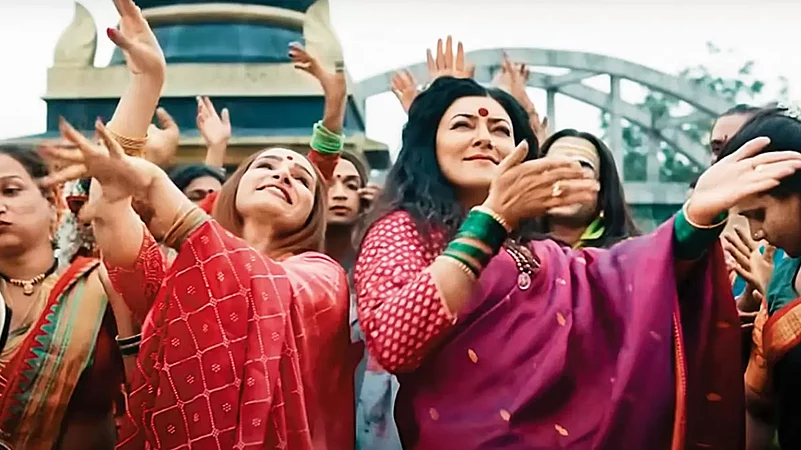One of the reasons Season 2 of the series Made in Heaven is progressive in its approach to social issues is the character of Meher, played by Trinetra Haldar Gummaraju. The social media response to Meher, particularly by queer and trans folks and Trinetra gaining traction on IMDb is testament to the fact that something was done right. The character saw a rare empathetic and affirmative portrayal of trans people in the Indian media. Another show which has been gaining popularity is Taali featuring Sushmita Sen in the lead role of transgender rights activist Shreegauri Sawant from Mumbai. Between Taali and Made in Heaven, the prominent questions that come up: Who gets to play trans roles? And who decides the norms of representation?
There has been much debate about cisgender actors playing trans roles. The debate makes many prominent points, most of which are discussed in Netflix’s documentary Disclosure: Trans Lives On Screen. At this moment, we do need an Indian counterpart as the documentary deftly looks at the depiction of trans lives in the media and what cultural shifts it brings in. There are so many roles and movies that actually got some parts of trans representation right, if not everything. And more than the mainstream media, the focus needs to be shifted to independent projects and regional media.
Ironically, a lot of trans narratives in reel life discuss how it is difficult for trans persons to find a decent job. And yet, a cisgender actor plays a trans role in real life. This is also where Trinetra’s Meher comes in as when cis actors play trans roles, they end up setting expectations of trans bodies which are not always true or authentic. In fact, there is much contention around what makes a trans person pass as a cis person and uninformed representation adds more baggage to this, which ends up impacting trans people in their real lives.
Rayyan, a trans filmmaker, content strategist and writer from Mumbai, shared on Instagramstory on how Meher is “the most respectful, sensitive, informed, aware and progressive portrayal of a trans character in mainstream cinema or Indian TV.” While Rayaan also criticises the sexualisation of the character and the reduction of its dimension to solely Meher’s dating life, it is undeniable that it makes a huge difference when a trans person plays a trans character. And these affirmative representations should be taken as the focal point in the future by filmmakers before they decide to cast cis actors in trans roles.

There are other considerations as well because in a fair world, everyone would have equal opportunities. However, the media already suffers from pay disparity when it comes to female filmmakers and trans people are further marginalised in the industry. It only makes sense that trans actors playing trans roles bring authenticity to the screen, informed representation and also makes the industry a space where more diverse people can participate.
Another recent instance of representation which can be deemed authentic is the actor Ivanka Das in Netflix’s Bombay Begums. Having said that, it’s not that easy as Das herself has brought to question why she is only made to do trans roles and not the roles of ciswomen. What is crucial here is that Bollywood has a very rigid idea of what gender roles it has in its movies and while OTT platforms are working to change this, it’s not enough as they are also stuck with stereotypes. Perhaps, when the creative industry will understand how gender operates as much as a social experience as a biological one (although I am not supporting biological essentialism here), then there will be change for the better.
Other prominent trans actors playing affirmative trans roles include Harshini Mekala and Muvvala in multiple Telugu films. The latter, along with her troupe Spicy Girls, were featured in the Rajnikanth and AR Murgadoss film Darbar. As mentioned in a post by the platform ‘Yes We Exist,’ trans rights activist, author and theatre artist A Revathi (popularly known as Revathi Amma) made her acting debut in the Tamil film Thenavattu in 2008. Later on, she also appeared in the Malayalam movie Antharam, which featured another trans actor Negha Shahin from Tamil Nadu. Shahin also became the first trans actor to win the Maiden Award at the Kerala State Film Awards.

This brings us to the second consideration regarding representation—affirmative representation matters but it should take cognizance of the fact of how the media works in general and recognise that this is also labour and not a social service. It is pertinent that trans actors are not reduced to merely activist status where they bring in sharp commentary on social issues. They also form a part of the industry and there needs to be recognition for them too. It’s not just trans actors but also trans writers, directors and producers along with other roles that bring in authentic form of representation.
For instance, screenwriter Gazal Dhaliwal who identifies as a transwoman wrote the screenplays for Lipstick Under My Burkha, Ek Ladki ko Dekha toh Aisa Laga, Qarib Qarib Single, Mismatched and Feels Like Ishq. While all of these might not have explicit trans roles, they do have a sensitive understanding of gender to an extent which vastly differs from what Bollywood had been portraying so far. Cis actors playing trans roles not only adds pressure on trans people to look a certain (read: cis passing) way but also fetishises primarily transwomen which again falls into the trap of stereotypes and token representation as there is a dearth of representation from transmen, non-binary and gender-fluid people.
This is where we circle back to why trans actors should play trans roles because they know the lived experiences first hand. Stories of gay men and largely transfeminine persons do not present an intricate look at trans lives. Most of these characters just play into already familiar tropes with Bollywood-istic roles. Even Taali, which covers some crucial ground for trans persons’ lives, it centres on motherhood too strongly at times. And that is where Made in Heaven differs because the dating experience is real. Unfortunately, that is seen through a single identity framework (also a privileged location) but this doesn’t take away the fact that those experiences are real. And it’s not banking on the trauma selling point of trans lives as Meher moves on to find what she deserves. However, Made In Heaven could have made slight differences in terms of how sensitive it is in the portrayal of trans lives, nevertheless, it’s a rightful first step.
Rajeev Anand Kushwah is a writer and researcher working on queer experiences
(This appeared in the print as 'Fair Portrayal Matters')





















